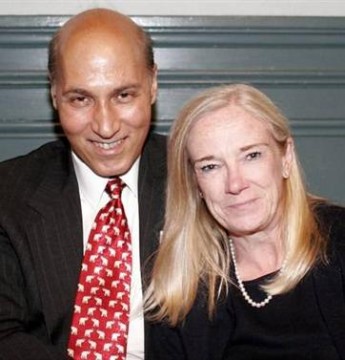
Matt Wolfe and his wife, Denise Furey (Photo from wolfe.org)
Editor’s Note: This is the third and final installment in a series of Q&A’s with local political candidates before the primary election on May 20. Wolfe is running in a special election for the City Council at Large seat, which every registered voter, no matter party affiliation, can vote in. For more information, visit: http://www.votespa.com.
J. Matthew Wolfe wants to change Philadelphia.
To Wolfe, a local lawyer with a practice near Clark Park, Philadelphia is a city with potential—one that can only shine brighter in the coming years. But, he says, that potential won’t be fully realized with the city’s current administration, which Wolfe claims has made Philly the “poorest big city in America.”
That’s why Wolfe is hoping to shake things up in this famously Democratic city. Running on the Republican ticket, Wolfe is vying for the City Council at Large seat vacated by Bill Green (who resigned to head the School Reform Commission) in a special election May 20th. And, according to Wolfe, a stronger Republican presence in the city government can only make for a better Philadelphia.
West Philly Local had a chance this week to chat with the 58-year-old Wolfe—who has a long, prestigious resume including a stint as Deputy Attorney General—about why he is running, and how he can reform the city he so loves.
West Philly Local: Why are you running for City Council?
Matt Wolfe: There’s a great reason to be optimistic about Philadelphia’s future. I’m out in West Philly, and driving down Chestnut and Market Streets during the day, winding around the hundreds of millions of dollars that are being invested in University City… Developers have enough confidence in our city. They’re coming in. They’re rehabbing things. And they’re doing it for one reason and one reason alone: they believe they can make some money there. … Point Breeze, a decade ago, was one of the most dangerous places in [South] Philly. No longer. And that is all happening in spite of the total lack of leadership at City Hall. Unfortunately, we would admit what we see that is good, we’re still lagging dangerously behind our peer cities—you know, New York, Washington [D.C.], Baltimore, Boston. … We’re behind. There’s no reason that we should be.
But the reason is kind of simple. Philadelphia has been governed by professional politicians for over half a century. It left us, by many measures, the poorest big city in America. There was nothing accidental here. There was no storm. There was no flood. It was a deliberate decision made my politicians who care only about getting re-elected and amassing political power, and not anything about the future of the city.
We see that time and time again. Drive down City Line Avenue. On one side, you see office towers; the suburban side. On the other side, you’re gonna see strip malls and old office buildings, by and large. That’s because you give all your employees a three percent raise by moving across City Line Avenue. You don’t have to be hassled with the high business tax over there. Real estate taxes are high [there], but it doesn’t balance out. It is an incentive to leave, and they have left. We need to reform the way we govern Philadelphia, and we can.
WPL: How would you reform how Philadelphia’s governed?
Wolfe: The first thing to look at is our tax rates and tax structure. When you tax things that can pick up and leave, they pick up and go. When you tax wages and businesses heavily, they scratch their heads and say, “Well, so long.”… Back when there weren’t state highways, and there weren’t airplanes, a factory had to be within walking distance of its workforce. They needed to be near lines of transportation, which were rivers and railroads. That factory wasn’t moving to Blue Bell. It wasn’t happening. It couldn’t happen. So it made sense to balance your taxes towards that. Well, the city changed, but the city government didn’t notice. …
We have to reform our actual tax structure. We need to lower our tax rates. When Ed Rendell was mayor, when John Street was mayor, every year they lowered the wage tax incrementally. … What did Michael Nutter do when he took office? He immediately eliminated the plan to continue lowering the wage tax, and he’s never reinstituted it. Not only did Nutter stop the lowering of the wage tax, but he found a tax to raise each and every year that he has been there. If you really wanted to hurt Philadelphia, and you are in a governmental position to do it, probably the best way to do it is to increase taxes. Cities move slowly. It’s not like you raise a tax and everybody leaves. But over time, it does make a difference. More and more people wake up and realize the financial benefit of moving outside the city.
What we need to do is re-prioritize our spending. We need to spend money on what I like to refer to as “core municipal responsibilities.” … Philadelphia should not be getting involved in health and welfare spending; that’s something the state and federal governments need to do. You can’t just look at things and say, “Gee, that’s nice. Let’s do that.” There are consequences to that. Philadelphia spends money on certain things that attract problems. That’s why certain things have to be done on a regional level [and] certain things have to be done on a municipal level. … Police and fire are a responsibility we need to pay for, and we do a pretty good job of that, but we could do better. Sanitation is something that we do a pretty good job with, but that’s a municipal responsibility. Something [else] we do very badly is educate our children…
WP: Which brings me to my next question. Like many other candidates this year, part of your platform is education reform. How is your vision different? How will it help the education crisis the city has faced for years?
MW: When you say something’s for years, it ceases to be a crisis, and simply becomes a problem. A crisis is something that comes up unexpectedly. City Council and the mayor have put us in this position. The bottom line is, when we spend money on economic development, we’re not spending money on schools. When we spend money on health and welfare that the state should be picking up, we’re not spending money on schools. When we’re spending on some program that maybe helps some people, or maybe just helps the people [who] are running the program [who] are close the councilman [who] sponsors it, we’re not spending money on schools. It’s not rocket science. Philadelphia could reallocate money and spend it on schools. They aren’t willing to do that—and one of the reasons they’re unwilling to do it is there’s a state law that says if Philadelphia increases the amount of money from the general fund, that it transfers to the school budget, they can’t reduce that the following year. [Ed. Note: Section 2502 of the Public School Code of 1949 states the amount of basic education funding allocated to a school district must be equal to the amount of the previous year.] That’s one reason City Council is always very reluctant to spend money on schools because they know that that’s gonna come out of the special interest programs they each worry about more than schools because their special interests help them get re-elected. And that’s really what’s going on here.
The schools have to be run more efficiently. … I would say what they need to do is close the schools that are under capacity, period, and do it now…You can’t just say, “We need more money.” I think they do, and I think the City Council should give them more money. I have absolutely no problem spending more money on our schools. But there has to be a comprehensive approach here.
The amazing thing is that last year, they somehow convince the State Legislature to allow Philadelphia to make its temporary one percent sales tax permanent. But the reason they let them do that was so they could use that money for the schools—it would be $120 million dollars this year. Well, they haven’t allocated that money because City Council wants to split the amount of money between schools and other worthy cause, shoring up our ridiculously underfunded pension fund. But, I’m sorry, you can’t do that. The legislature allowed Philadelphia to make its one percent sales tax permanent specifically and only for the schools. … They need give that entire amount of money to the schools, period. End of story.
WP: But the council and Philadelphia are traditionally Democrat. As a Republican, how do you get past that in your campaign? Why does the city need Republican voices?
MW: Number one, I think three of our best performing [council members] are the Republicans on there. The politician hasn’t been born yet that I agree with on every issue, but generally speaking, the three Republicans on there have been standing up for Philadelphia and trying to make some of the changes that will move us in the right direction. Bottom line is, though, listen to what I have to say. I’m getting a good response when I’m out talking about this. I say the same thing to everybody. I don’t tailor my message for the audience. I think this is the direction we need to go; I’m not alone in saying this. … If you raise taxes and people have the option of going somewhere else and paying, they’re going to do that. If you tax something, people are gonna buy less of it or buy it from somebody else. … This is just simple. Look where voting on party label rather than what people are saying—more importantly, what people are doing—look at where that gets you. I’ve said on many measures, the poorest big city in America, and we got the government we elect. I’m hopeful that I’ll get elected and can move towards making some changes.
I have worked hard over the past seven to try to bring new leadership to the Republican party. We had literally a civil war in the city, and we ended up with a compromise. We’re in a much better place. …A stronger Republican party in the city would benefit Philadelphia. We’re not gonna have honest elections in Philadelphia—we’re not gonna have honest government in Philadelphia–until there’s a serious contest. We’re rebuilding from the grassroots level and we’re talking about ideas for the idea that will move Philadelphia in the right direction. I’m proud of where we are.
–Annamarya Scaccia
Correction: An earlier version of this article stated Point Breeze was in West Philly. That was in error, which we regret.







May 9th, 2014 at 3:38 pm
Point Breeze is in West Philly?
May 11th, 2014 at 8:31 am
I think this was a very interesting article. It is a shame that money from the school can’t come from the general fund as described. You don’t hear about that very often, for obvious reasons. I disagree about the pension question – that is part and parcel of the costs of working for the schools at this point. Philadelphia teachers are paid comparatively poorly for working in very difficult conditions, and with incredible social problems to try and solve, or should I say, alleviate if possible.
Also, the word in this line, “how do you get passed that in your campaign” should be, “how do you get past that in your campaign”. Note to author of article.
Mary Jane Laquer, M.Ed., CCC/SLP
Speech / Language Pathologist
May 11th, 2014 at 8:34 am
Make that, “money for the schools”!